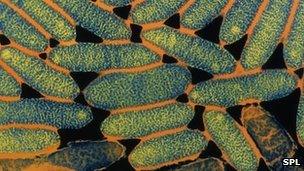Legionnaires' disease man dies in Edinburgh outbreak
- Published

A man in his 50s has died as the number of confirmed and suspected cases of Legionnaires' disease in an Edinburgh outbreak continues to rise.
The man, who had underlying health conditions, was being treated at the Royal Infirmary of Edinburgh.
NHS Lothian said it was dealing with 17 confirmed and 15 suspected cases but expected more.
The Scottish government says it is doing everything possible to try to identify the source.
A meeting of its resilience committee has been scheduled for Wednesday morning to co-ordinate the official response to the outbreak.
The source of the infection is still being investigated with the potential area for infection estimated at about 44 square miles.
This is because NHS Lothian is working on the basis that the potential area of infection is about seven-and-a-half miles in diameter.
Industrial water cooling towers in the south west of Edinburgh, where all of the cases have come from, have been identified as a potential source of the disease, which cannot be spread directly from person to person.
Sixteen cooling towers at four industrial sites in the area have been treated and checked by environmental health staff in an attempt to halt the outbreak.
One of these could be the source of the outbreak but the results of tests may not be available for several more days.
Dr Duncan McCormick, a consultant in public health medicine, said medical staff were identifying possible cases in an attempt to discover the full extent of the outbreak.
Confirmed cases
NHS Lothian's Dr Duncan McCormick: "We hope we have detected the source and dealt with the cooling towers"
"I would like to reassure the public that household water supplies are safe and that Legionnaires' disease cannot be contracted by drinking water," he said.
"Older people, particularly men, heavy smokers and those with other health conditions, are at greater risk of contracting the disease.
"I would urge anyone who develops symptoms of Legionnaires' disease to contact NHS 24 or their GP."
NHS Lothian said the majority of the confirmed cases were linked to the Dalry, Gorgie and Saughton areas of the city.
Thirteen men and two women, aged between 33 and 74, are in a critical condition and are being treated in intensive care in hospitals in Lothian.
Contaminated water
The first case was identified on Monday 28 May.
The Legionella bacteria is commonly found in sources of water, such as rivers and lakes. It can end up in artificial water supply systems, including air conditioning systems, water services and cooling towers.
Legionnaires' disease, which is not contagious, is contracted by breathing in small droplets of contaminated water.
Symptoms include mild headaches, muscle pain, fever, a persistent cough and sometimes vomiting and diarrhoea.
- Published4 June 2012